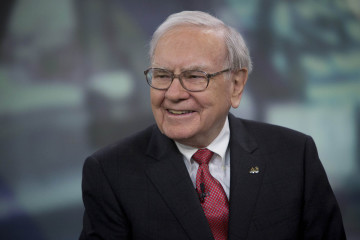Matt Levine’s Money Stuff: Benign Ownership and Opaque ETFs

©2016 Bloomberg View
O3BAFL6JTSEF
The Buffett letter
Warren Buffett’s annual shareholder letter this weekend contained the requisite quantum of folksiness, but in some ways the most old-fashioned part was this description of the differences between Berkshire Hathaway and its occasional partners at 3G Capital: Their method, at which they have been extraordinarily successful, is to buy companies that offer an opportunity for eliminating many unnecessary costs and then – very promptly – to make the moves that will get the job done. Their actions significantly boost productivity, the all-important factor in America’s economic growth over the past 240 years. Without more output of desired goods and services per working hour – that’s the measure of productivity gains – an economy inevitably stagnates. At much of corporate America, truly major gains in productivity are possible, a fact offering opportunities to Jorge Paulo and his associates.
At Berkshire, we, too, crave efficiency and detest bureaucracy. To achieve our goals, however, we follow an approach emphasizing avoidance of bloat, buying businesses such as PCC that have long been run by cost-conscious and efficient managers. After the purchase, our role is simply to create an environment in which these CEOs – and their eventual successors, who typically are like-minded – can maximize both their managerial effectiveness and the pleasure they derive from their jobs.
3G’s strategy of finding underperforming companies and adding value with ruthless efficiency is straightforward enough. But Buffett’s strategy is to buy already-good companies and just sort of stare at them admiringly. Where, as they say, does Buffett’s alpha come from? (There is a well-known paper.) What is the point of Berkshire Hathaway? It does not aim to improve companies or add value — “If you want to guarantee yourself a lifetime of misery, be sure to marry someone with the intent of changing their behavior,” says Buffett, citing Charlie Munger — but only to allow those companies’ executives to bask in the pleasure of a job already well done.
It’s all very 20th-century. We live in a world of efficiency, of measurable performance, of quantifiable factors, in which investment managers are expected to explain what value they add and how they get their alpha. 3G’s classic private- equity approach is a standard model; activism is another; Berkshire rejects them both. Berkshire’s approach is to just have a friendly genius pick the right stocks, in a low-key, unquantified and intuitive way, and then to do nothing with them. Buffett may be the last great proponent of that model.
Anyway he’s on the hunt for more good businesses to buy, if you know of any. (After the Precision Castparts Corp. acquisition, Buffett writes, there are “just under 98% of America’s business giants that have yet to call us. Operators are standing by.”) He is not impressed by politicians’ economic pessimism. Cullen Roche argues that “a central aspect of Warren Buffett’s investment strategy” is “his long-term optimism.” Bloomberg Gadfly’s Tara Lachapelle explains Buffett’s acquisition strategy. Bloomberg View’s Justin Fox made a word cloud. Bloomberg’s Luke Kawa annotated the letter. Buffett is not worried about bond market liquidity.
As for the much-anticipated sexy metaphors, there’s a Woody Allen joke about how “the advantage of being bi-sexual is that it doubles your chance of finding a date on Saturday night,” but he’s used that one before. (Nassim Taleb points out the error in Allen’s statistical reasoning.) Buffett also mentions that, though he spends ten hours a week playing bridge online, “I’m not ready for Tinder.” Which seems a bit superfluous, in an investor letter.
Asset management
Buffett’s model may be old-fashioned, but what are the alternatives? “Assets managed by hedge funds globally last month fell to less than $3 trillion for the first time since the industry hit the milestone in May 2014.” Meanwhile in traditional asset management, the knives are out: “BlackRock, the world’s largest fund manager, has bet against the share price of struggling competitor Aberdeen Asset Management ahead of the Scottish investment group’s expected fall out of the FTSE 100.” And the Department of Labor’s fiduciary rules are “likely to put revenue sharing into retreat,” writes Jason Zweig.
In more hopeful news, Eaton Vance has launched its “NextShares” (or “exchange-traded managed fund”) product, which is basically an actively managed mutual fund with enough of an exchange-traded-fund overlay to get the tax and trading-cost savings of an ETF. We’ve talked about it before, and I think it’s kind of neat, “but it remains unclear whether Eaton Vance will be able to draw investors to ETMFs because almost no securities firms have made the changes to their systems necessary to support the new funds.” Oops! Here is some general worrying about how NextShares means that “the $2 trillion market for U.S. exchange-traded funds is growing more opaque even as regulators warn the asset class is already too complicated for some investors.” As is so often the case, the right question here is “compared to what”: NextShares are somewhat more opaque than regular index ETFs with constantly updated net asset values, and somewhat less opaque than regular mutual funds with once-per-day liquidity. But “the $6 trillion market for U.S. equity mutual funds is growing slightly less opaque” is not a sufficiently worrying story. It’s all in the framing.
Elsewhere, here is Cullen Roche on indexing; I particularly liked this part: The vast evidence on the failure of active managersover the decades shows that public market investors don’t understand corporations better than managements. I don’t see how this evidence adds credence to the idea that we should want public investors to be even more active in the daily management activities of corporations….If anything, the failure of active managers means we should want public investors to voice fewer opinions about how companies should be run and instead of voting with their proxies, stick to voting with their wallets.
The theory, I take it, is that active investment managers don’t do much better than a coin flip at picking stocks, which is their core job, so why should they do better than professional corporate managers at managing corporate operations, which isn’t? It’s a fair question that might have some relevance to, e.g., the stock buyback debate: Who among us, really, is any good at allocating capital?
Elsewhere: Dan Loeb is buying equities. The stocks favored by analysts are the worst stocks. And what’s Leon Cooperman up to?
A valuation dispute
I don’t know what’s going on here but it sounds fun: The traders and the bank’s valuation committee disagreed over the amount of reserves taken for certain Treasury trades known as strips, the Financial Times has learnt.
The JPMorgan traders wanted to increase the size of the reserve and went around the valuation committee to do so, said people familiar with the matter. JPMorgan believed this subsequent move violated internal bank procedures and fired the traders, they added.
What they did to increase the size of the reserve was pretty cute. “Banks mark Strips at fair market value, but they also set aside liquidity reserves to protect against any downside because the market trades infrequently and Strips may be hard to sell in volatile periods.” But you can just turn regular Treasuries, which are liquid, into Strips, which are less liquid. So these traders “went around the valuation committee by taking existing, liquid Treasury trades, and turning them into the more illiquid Strips, increasing the size of the Strips book and thereby increasing the overall reserve.”
One thing to say here is that if your accounting (or reserving, or whatever) regime gets different outcomes for different ways of describing the same securities (one reserve for a bucket of Treasuries, another for the same bucket chopped into Strips), then it will be abused. Another thing to say is that it’s a little weird that the traders wanted to increase the reserve? “Under accounting rules, the reserves are deducted from the bank’s profit-and-loss statement,” and the stereotype is that traders want more aggressive valuations and fewer deductions, while valuation committees are boring worrywarts who like big conservative reserves. I’m sure they had their reasons though.
Valeant
Here is some reading of the old tea leaves:”His coming back is very good, to the extent the ad hoc committee found something, he wouldn’t have been allowed back,” said Umer Raffat, an analyst with Evercore ISI.
“He” is Valeant Chief Executive Officer Michael Pearson, who has been out for two months with severe pneumonia, but who is now back in charge. Meanwhile Valeant “is withdrawing its financial forecast and will delay releasing fourth-quarter results,” as the ad hoc committee examining its financials has found something, specifically that “about $58 million of revenue recognized in late 2014 should have instead been booked the following year.” I suppose Raffat is right that this counts as a venial sin. Bloomberg’s Cynthia Koons and Neil Weinberg had five questions for Valeant on Friday; Pearson’s return answers one of them (about his health), but the others remain mysterious, and the withdrawal of guidance adds another mystery.
In tenuously connected news — another company going through some customer problems — here is the story of a memo sent by Gary Friedman, the head of Restoration Hardware: “We were sitting there discussing how the building caught on fire, why the building caught on fire, how long we expected the building to continue burning,” he said in the memo, which was confirmed by Friedman in an interview. “NO ONE WAS FOCUSED ON THE PEOPLE IN THE BUILDING WHO WERE ON FIRE. THEIR CLOTHES BURNING, AND MANY OF THEM DYING. WE HAVE LET CUSTOMERS DIE.”
I have never been to business school but I bet “Try not to let your customers die” is part of the curriculum.
Insider trading?
Here is a story about how “Honeywell International Inc. Chairman and Chief Executive Officer David Cote sold $36 million of shares in the aerospace manufacturer three days before it approached United Technologies Corp. with a purchase offer.” Is that bad? Should he not have done that? Let’s assume for the sake of argument that the sales weren’t done under a 10b5-1 plan, and that three days before Honeywell approached United, its CEO probably had some inkling that there might be a deal. “An executive generally can’t go sell stock in his own company on the eve of a major acquisition,” says a former Securities and Exchange Commission lawyer, but that isn’t actually the rule. The rule — for our purposes — is that the CEO can’t sell while in possession of “material nonpublic information.” Was the news of a possible bid material? Meh? Remember he was selling shares in the acquirer, and the acquirer’s stock-price reaction to a merger announcement is less predictable than the target’s. In the event, Cote sold the stock at an average price a bit below $105. “Shares of the Morris Plains, New Jersey-based company fell as much as 2.4 percent on Feb. 22 when the offer became public through news reports” — but that fall was to a closing price of $105.17. So his insider trading, if it was insider trading, doesn’t look all that prescient.
Of course that isn’t the standard. The standard is, is there “a substantial likelihood that the disclosure of the omitted fact would have been viewed by the reasonable investor as having significantly altered the ‘total mix’ of information made available,” and I guess if you were buying those shares from Honeywell’s CEO you might be interested in knowing whether it was about to announce a major acquisition. Still this does not seem like the sort of thing that the SEC would worry too much about.
People are worried about unicorns
Here is a story about how police in Madera Ranchos, California, “had to use a helicopter and thermal imaging” to find a lost unicorn, “which was hiding out in an orchard.” She probably mistook the orchard for the Enchanted Forest, which is of course just outside of Palo Alto and nowhere near Madera Ranchos. The poor lost unicorn. She was recovered and “promptly returned to her stable with her unicorn horn still intact.” Here are pictures. People were worried about her.
In other worrying signs for unicorns, Fidelity marked down 19 private companies in January. Brad Feld of Foundry Group says that “the retrade has reappeared in private investments”: The first indicator of it is that it now takes longer for a deal to close. I expect the days of transactions closing 15 days after a term sheet is signed are probably gone for a while. While some lawyers are breathing a sigh of relief, a deal that takes more than 30 days to close often starts to have a little bit of retrade risk. And, when a deal stretches out over 60 days, there’s a lot of risk around deal certainty – both retrade as well as a full deal collapse.
Zenefits, the Unlicensed Insurance Agent Unicorn, “plans to cut about 250 jobs,” mostly in sales. Here is an awkward “Letter to Zenefits Customers.” And here is a story about founding a startup as a “pregnant brown woman” in Silicon Valley. The founder in that story, Nathalie Miller, previously worked at Instacart, where “one day, a new employee told her that he had ranked the hottest women at the company, and she was No. 1.” It’s a perfect little parable of Silicon Valley: Everything is quantified, but problematically.
People are worried about stock buybacks
I am not going to pretend that I love all of my recurring “people are worried about whatever” sections equally, but I am a little sad that people haven’t worried much about stock buybacks recently. My sadness may be due to the fact that back in the heyday of “people are worried about stock buybacks,” I could joke that the 2016 presidential election might come down to the Rule 10b-18 safe harbor, which was pleasant enough compared to actual contested issues like whether the President of the United States of America should disapprove of Mussolini and the Ku Klux Klan. But I digress! Here is Justin Lahart at the Wall Street Journal worrying about stock buybacks; specifically, he is worried about past buybacks funded with debt:
The sticking point is that in a low-growth environment, paying down debt also may be harder. Especially because companies weren’t putting the money they borrowed into capital investments, which provide cash flows to help service debt. The stock they bought back won’t do that for them.
On the other hand, “High-Dividend Stocks Gain Appeal.”
People are worried about bond market liquidity
“AllianceBernstein credit aggregator tackles bond illiquidity” is the headline here, and “liquidity is getting harder than ever to access” is one quote. And in the new-issue market: By Citi’s calculations the market for significant new investment-grade deals saw 75 ‘no go’ days over the past 12 months, in which the primary market was essentially shut. That’s a higher rolling 12-month figure than what was seen during the depths of the financial crisis in 2008 to 2009.
And the Financial Industry Regulatory Authority “approved a proposal designed to help retail customers understand and compare transaction costs in fixed-income securities,” which would, if approved by the Securities and Exchange Commission, “require member firms to disclose on retail customer confirmations the ‘mark-up’ or ‘mark-down’ for most transactions in corporate and agency debt securities.”
Things happen
China Moves to Bolster Lending by Easing Banks’ Reserve Ratio. Impatient Barclays Investors Await CEO’s Plan. Anshu Jain to join online lender SoFi. LendingClub and the Limits of FinTech Disruption. EU Tax Ruling May Prompt Business Move Out of Belgium. Overdraft Practices Continue to Gut Bank Accounts and Haunt Customers. Big Banks Made 8% Of Their Profits Last Year From Overdraft Fees. Haldane Pushes Bank of England to Probe Future of Cash. Fallen angels. Banks launch drive to crush outsized XVAs. Africa’s Richest Woman Draws Scrutiny Over Source of Wealth. Gold Becomes the Biggest Winner of 2016. The Best Way to Invest aSingle Dollar.Crypto Wars II. Yoenis Cespedes’s cars. Reminder: Everything is wire fraud. Report: Getting Out Of Bed In Morning Sharply Increases Risk Of Things Getting Even Worse. Village Goose Killed In Drive-By Shooting. A Starbucks is opening in Milan. Noisy Dissent Disrupts aHarpsichord Recital. Happy Leap Day!
This column does not necessarily reflect the opinion of the editorial board or Bloomberg LP and its owners.
To contact the author of this story: Matt Levine at mlevine51@bloomberg.net To contact the editor responsible for this story: James Greiff at jgreiff@bloomberg.net
For more columns from Bloomberg View, visit http://www.bloomberg.com/view






No Comment